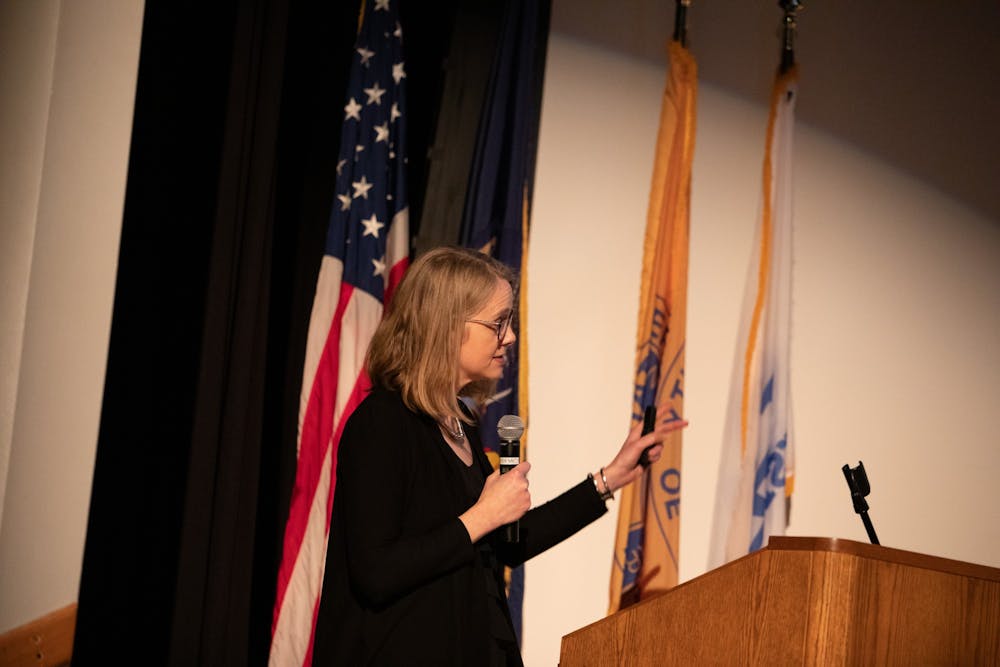Donned with floral leis, students tossed large beach balls around the Student Union Theater as they awaited the start of the UB Honors College’s Annual Life Raft Debate Monday evening.
Professor Martha Bohm, a first-time competitor, won this year’s debate , receiving a nameplate on the trophy oar. Bohm received 26% of the 80 overall votes — just one vote more than the runner-up, Mark Frank.
The debate takes place in a fictional end-of-the-world scenario. The students in the audience, stranded on a hypothetical life raft in the ocean, represented a small group of survivors who were escaping a “global cataclysm” to begin a new civilization. With only one seat life on the raft, students must choose one professor from among the debaters — Frank, Bohm, Chad Lavin, Cecilia Martinez-Leon, Noemi Waight and Joseph Costa — to take with them as they rebuild society.
“Professors are representing their disciplines, not just themselves,” Patrick McDevitt, Academic Director of the UB Honors College, said in his introduction.
Costa, last year’s winner and professor in the Department of Anatomical and Pathological Sciences, had to play “devil’s advocate.” Costa said his job was to “do his best to get the students to not select anyone, to keep the seat open on the life raft.” Despite the daunting task, Costa said he felt confident and “very comfortable” heading into the debate.
In the audience was Costa’s daughter, Julia, who said it was “cool” seeing her father back on stage following his “exciting” win last year.
First in the random speaking order was Bohm, professor of architecture and Associate Dean for Academic Affairs. Bohm, like the other contestants, was given eight minutes to make her case to the audience.
“Architecture is the cornerstone of civilization, and architecture invented cornerstones,” Bohm said, going on to argue that bringing an architect on the life raft would ensure that students would have shelter.
But her argument wasn’t solely practical. Bohm cited examples of spiritually significant architecture, such as the Hagia Sofia and the Vietnam Veterans’ Memorial in Washington D.C.
“I think there’s real meaning that we need to find, and memory we need to maintain. I think we need a place that does that, a place of dignity, and you need to remember what we’ve lost,” Bohm said. “After 9/11, we built a memorial to remember that place and that loss. And that’s what spatial design architecture can do: give us a place to hold our memories”
Following Bohm was Lavin, an English professor arguing for political theory, who took a more playfully flattering approach. Planting the seeds of contempt between survivors on the raft, Lavin argued that political theory “helps us understand what power is,” which he stressed is important “if you want to take control of this raft.” He compared political theorists to Machiavelli, a master manipulator, whom Lavin noted as the type of person you’d need on the raft to maintain order.
“Politics is essentially a struggle on the battlefield of language,” Lavin said. “We’re going to need some stories that give our life meaning and purpose. Stories that make us believe that we are a we.”
Martinez-Leon, director of the Engineering Management Program and an industrial engineering professor, followed with a compelling slideshow and a figurine of Remy from “Ratatouille.” “My job is not just to get you there, but to help you achieve your goals,” Martinez-Leon said.
As a master of systems, she reminded the audience that “we are systems, we live in systems.”“Do you want to just survive, or do you want to have fun?” Martinez-Leon said, before she put on a “Vote for Ceci” ringer T-shirt.
Frank, a professor of communication, introduced his background in nonverbal communication by giving an overview of the history of Neanderthals, driving home the point that effective communication is necessary for survival.
Frank reflected on his days as a bouncer at a bar, as well as the time he spent completing his doctorate in a medical school and working with military law enforcement, where he “did a little special agent training.” He used these experiences to highlight his other skills, while still maintaining that communication was most important.
“Communication helps us learn from the past to address current problems,” Frank said before dramatically dropping the microphone into his hand. Waight, a professor of science education, discussed her upbringing in Belize chasing lizards and playing with worms.
“All of these experiences were steeped in wonder,” she said.
Waight argued that “science education is at the crux of future possibilities — think big issues like food security, climate justice, climate sustainability, and resiliency,” she said.
She told the audience that having a science educator on the life raft would give them a team player, a collaborator, an innovator and a problem solver.
“Scientifically literate people are better positioned to make critical decisions that benefit all of humanity,” Waight said.
After Waight made her opening statement, rebuttals began. The contestants each had two minutes to refute the claims of the others and reiterate why their discipline would lead to success. Bohm attempted to bribe students for their votes with pencils.
When the rebuttals concluded, Costa, the devil’s advocate, posed rhetorical questions for the audience to consider while voting. He asked which of the disciplines are immediately useful, and which ones ensure long term survival. He noted that he was the first person to ask the question: “What can you do without any of these disciplines?”
After being elected the victor, Bohm attributed her success to “thousands of years of fantastic work” that she was able to leverage in the debate.“Architecture is critical for shaping our tomorrow,” she said.
Editor's note: This article has been updated to include Mark Frank in the complete list of debaters.
The news desk can be reached at news@ubspectrum.com





